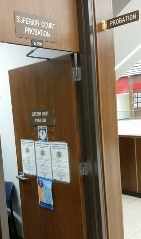While on parole, Christopher Gonzalez used a hammer to hit Daniel Castillo in the face, fracturing his jaw, skull, cheekbone and nose. Police arrested Gonzalez and as they began questioning him, he invoked his constitutional right to have an attorney present.
Overview: Confession is inadmissible when probation officer promised shorter sentence if suspect waived right to an attorney.
Gonzalez then agreed to speak with his parole officer, as he was summoned to the police station. The parole officer advised Gonzalez that unless he agreed to cooperate with police, the parole officer would have to write in his report that he recommended the maximum punishment. This meeting with his parole officer only lasted ten minutes.
Gonzalez then immediately agreed to speak to detectives without his attorney present. The parole agent’s promise was obviously fresh in his mind.

Gonzalez then admitted to attacking Castillo and was charged with attempted murder (Penal Code §§ 644 and 187(a)), assault with a deadly weapon (Penal Code § 245(a)(1)), simple mayhem (Penal Code § 203) and aggravated mayhem (Penal Code § 205). The complaint alleged a great bodily injury enhancement as well (Penal Code § 12022.7(a)). After a bench trial, the judge sentenced Gonzalez to an indeterminate sentence of fourteen years to life.
During trial, Gonzalez moved (asked the judge for an order) to exclude his post-arrest confession, contending it violated his rights under
Miranda (
Miranda v. Arizona (1966) 384 U.S. 436, 86 5.Ct. 1602) and under the Fifth and Fourteenth Amendments of the U.S. Constitution. The trial court in San Diego denied the motion, finding that Gonzalez voluntarily waived his right to counsel and to remain silent.
Gonzalez then appealed to the Fourth Appellate District, contending that the trial erred in admitting his confession, but also contending that he could not be convicted of both aggravated mayhem and simple mayhem because simple mayhem is a necessarily lesser-included offense of aggravated mayhem.
The Appellate Court first addressed the confession. It noted that where a person in authority makes an express or clearly implied promise of leniency or advantage for the accused which motivates a decision to confess, the confession is involuntary and inadmissible. However if a suspect asserts his right to counsel and then later confesses, the confession can be admissible if it is self-motivated.

Here, the parole agent certainly was in a position of authority to Gonzalez. The parole agent’s statement to Gonzalez that he would recommend maximum punishment if Gonzalez did not speak honestly to the police was improper coercion, especially because Gonzalez told the parole agent he feared going back to prison. In other words, the parole agent clearly implied or suggested leniency in exchange for a confession from Gonzalez. Consequently, the trial court erred in denying Gonzalez’s motion to suppress his confession.
However, the Fourth Appellate District ruled that the error was harmless beyond a reasonable doubt. An error is harmless when it is found to be “unimportant in relation to everything else the jury considered on the issue in question, as revealed in the record. “
Yates v. Evatt (1991) 500 U.S. 391, 403, 111 S.Ct. 1884. Under this standard, the prosecution must show that the verdict was attributable to the error. Here, that could not be shown, given the other evidence supporting the verdict.
Regarding the conviction for simple mayhem and aggravated mayhem, the court noted that simple mayhem is a general intent crime, whereas aggravated mayhem is a specific intent crime. However, the appellate court noted several reported decisions wherein simple mayhem was considered a lesser-included offense of aggravated mayhem. Therefore, the court directed the trial court to vacate the conviction for simple mayhem.
The citation for the Court of Appeals ruling discussed above is People v. Christopher Gonzalez (2012) 210 Cal.App.4th 875, 148 Cal.Rptr.3d 720.
For more information about issues involving confessions and admissions, click on the following articles:
- If You Receive Miranda Warnings, Your Talking and Subsequent Silence to Certain Questions Can Be Used Against You As Adoptive Admissions
- An Admission Is Inadmissible If After an Illegal Search As the Fruit of a Poisonous Tree
- Suspect’s Fifth Amendment Rights Not Violated When He Volunteered Statements About His Killing Another
Contact Greg Hill & Associates

